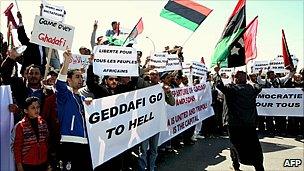EU to open Benghazi office to aid Libya rebels
- Published

The EU plans to open an office in the rebel-held Libyan city of Benghazi to improve the flow of aid for the authorities there, EU foreign policy chief Catherine Ashton has said.
The office will help support civil society and the Interim Transitional National Council opposed to Libyan leader Col Muammar Gaddafi, she said.
Baroness Ashton was speaking to Euro MPs in a debate on EU foreign policy.
"There's much more we need to do," she told the European Parliament.
"Gaddafi must go from power and must end his regime," she said, earning some applause from MEPs.
She stressed the need for the EU to help the anti-Gaddafi rebels develop education, healthcare and border security.
Some party leaders in the parliament urged the EU to make a bigger commitment to supporting the pro-democracy movements in North Africa and the Middle East.
France and Italy have recognised the opposition Transitional National Council (TNC) as the legitimate representative of the Libyan people.
The EU has frozen the assets of Col Gaddafi and members of his family, and banned the supply of arms, ammunition and any equipment that could be used for "internal repression".
The EU has also frozen assets held by Libya's sovereign wealth fund and central bank.
Help for young Arabs
Last week Nato countries and several Arab states pledged to set up a temporary fund to help the Libyan rebels.
The TNC says it needs $2bn-$3bn (£1.2bn-£1.8bn) in the coming months for military salaries, food, medicine and other basic supplies.
Baroness Ashton urged the 27 EU member states to help the crisis-hit economies in the Arab world by providing "mobility, market access and money".
"These are young societies - and the young long for greater opportunities," she said, urging EU states to foster the training and business co-operation that could help lift Arab countries out of the economic doldrums.
"We have to have the political will to be committed to make our markets available. It's a challenge we have to rise to. If we don't, the failure of economies in our neighbourhood will have a direct effect on us," she said.
Plea for clear priorities
The head of the largest group of MEPs, Joseph Daul of the centre-right European People's Party, lamented moves to modify the EU's Schengen accord, which gives EU citizens passport-free travel across most of Europe.
France and Italy called for the Schengen review amid concern about an influx of North African migrants fleeing the turmoil in Tunisia and Libya.
Mr Daul said such migrants faced "bickering and closed borders" in Europe. "Is this worthy of Europe? I don't think so."
He urged Baroness Ashton to set clear foreign policy priorities for this year - "the Mediterranean, counter-terrorism and the Middle East conflict".
The liberal bloc leader, Guy Verhofstadt MEP, said the EU's financial assistance for Egypt was woefully inadequate. He warned of the risk of a counter-revolution as Egypt was heading for a budget crisis.
The violent government crackdown in Syria "is nothing less than an Arab Tiananmen", he said, comparing it with the bloodshed in China in 1989.
He mocked the EU's blacklist of 13 top Syrian officials now subject to an EU travel ban and asset freeze.
He said hundreds of people must go on the list, including Syrian President Bashar al-Assad.
Addressing Baroness Ashton, he said "I want you to declare that you give Assad a few days - if he's not stopping what he's doing then freeze the assets of all the Assad family!"